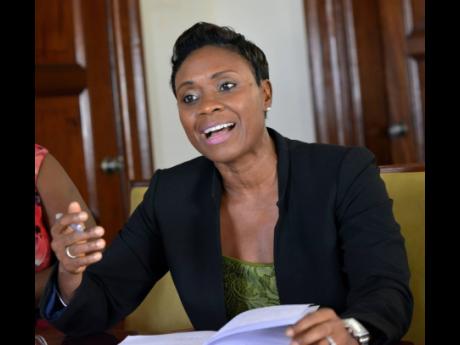Cuthbert-Flynn: I had an abortion at 19 - Parliamentary committee continues hearing arguments on thorny issue
Juliet Cuthbert-Flynn, the lawmaker whose parliamentary motion reignited a fresh round of debate on the charged issue of abortion, has disclosed that she terminated a pregnancy as a teenager.
Cuthbert-Flynn’s revelation came after anti-abortion advocate Carole Bridge also shared deeply personal details of how, amid an “inconvenient pregnancy” and medical treatment for a brain tumour, she ignored a suggestion by her physician to have an abortion.
“The immediate reaction of the highly qualified professor at the University Hospital of the West Indies was to insist that the only course of action was for me to have an abortion and as quickly as possible,” Bridge shared as Parliament’s Human Resources and Social Development Committee continued public hearings on a motion moved by Cuthbert-Flynn seeking to legalise abortion.
“His reasons were the drug would result in foetal abnormality and the strong possibility that the tumour could cause blindness because of its proximity to my optic nerve. Subsequent discussions with the doctor proved to be even more dire, regarding the medical outcome of keeping my child. Yet, nine months later, I delivered a perfectly healthy baby girl,” she revealed.
Cuthbert-Flynn, the member of parliament for West Rural St Andrew, revealed that she, too, had a brain tumour that was pressing on her optic nerve, causing her severe headaches.
‘Life-saving effort’
“I would have gone blind. I was 19 [years old], and I had to have surgery,” the first-time lawmaker and celebrated Olympian revealed.
“This was a life-saving effort for me because my headaches were so severe. I could not function. I was passing out every week – fainting, dropping down on the track, ending up in the hospital on a drip – not knowing what was wrong with me,” she recounted.
“I was not going to take that chance. I wanted to live, me,” she declared.
The emotional stories were shared yesterday as chairman of Parliament’s Human Resources and Social Development Committee, the Reverend Ronald Thwaites, signalled that a conscience vote may be the best way for lawmakers to resolve the issue of legalising abortions in Jamaica.
“One of the things that we should do, and we are pre-empting our discussions within the committee, is to certainly recommend that it be such, be a conscience vote,” Thwaites said in a meeting of the committee.
Dr Daniel Thomas, president of the advocacy group Love March Movement, suggested that the issue should be decided by a referendum.
Bridge said she was sharing her personal story because there are “some issues” in it that are applicable to the ongoing debate about whether Jamaica should remove the prohibition on abortion.
At the top of the list, she said, is that even with the best intentions, the most qualified doctors make mistakes and misdiagnose.
“When I presented my perfectly healthy baby daughter to the doctor, who had advised that I abort, his remark was, ‘Well, I am not God’,” Bridge said.
“Had I listened to my doctor, my only child and future generation would have been irrevocably destroyed. I would venture to say that it is possible that several persons would not be in this chamber today had their mothers listened to their doctor’s advice to abort them,” she insisted.

